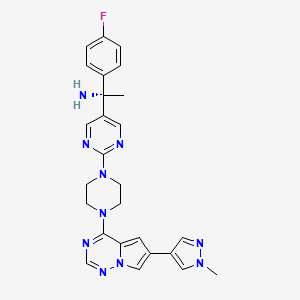
Blueprint Medicines Corporation (NASDAQ: BPMC), a precision therapy company focused on genomically defined cancers, rare diseases and cancer immunotherapy, announced that the U.S. Food and Drug Administration (FDA) has approved Ayvakit (avapritinib) for the treatment of adults with unresectable or metastatic gastrointestinal stromal tumor (GIST) harboring a platelet-derived growth factor receptor alpha (PDGFRA) exon 18 mutation, including PDGFRA D842V mutations. Ayvakit is the first precision therapy approved to treat a genomically defined population of patients with GIST.
The FDA granted a full approval to Ayvakit based on efficacy results from the Phase 1 NAVIGATOR clinical trial, as well as combined safety results from multiple clinical trials for avapritinib. In patients with PDGFRA exon 18 mutant GIST, Ayvakit had an overall response rate (ORR) of 84 percent (95% CI: 69%, 93%), and a median duration of response (DOR) was not reached. The most common adverse reactions (≥20 percent) were edema, nausea, fatigue/asthenia, cognitive impairment, vomiting, decreased appetite, diarrhea, hair color changes, increased lacrimation, abdominal pain, constipation, rash and dizziness. Blueprint Medicines plans to make Ayvakit available in the U.S. within a week.
GIST is a rare, genomically driven sarcoma of the gastrointestinal (GI) tract. Approximately 6 percent of patients with newly diagnosed GIST have PDGFRA exon 18 mutations. The most common PDGFRA exon 18 mutation is the D842V mutation, which is resistant to all other approved therapies. A retrospective study showed that when these patients were treated with imatinib, they had an ORR of 0 percent.2
"Today's approval of Ayvakit brings forward a new standard of care for patients with PDGFRA exon 18 mutant GIST, a genomically defined population that previously had very limited treatment options. For the first time, we can offer these patients a highly effective treatment that targets the underlying genetic cause of their disease," said Michael Heinrich, M.D., Professor of Medicine at Oregon Health & Science University and an investigator on the NAVIGATOR trial. "Building on our growing understanding of the molecular basis of GIST, this milestone ushers in a new era of precision medicine in this disease. The FDA approval represents a call to action to conduct mutational testing in all patients with GIST before initiating kinase inhibitor therapy, as recommended by clinical guidelines, so appropriate patients may realize the benefits of this promising new medicine."
"The full approval of Ayvakit based on robust data from our Phase 1 NAVIGATOR clinical trial is an incredibly exciting milestone for our company and, more importantly, for GIST patients with a PDGFRA exon 18 mutation, who have been waiting for a new treatment option," said Jeff Albers, Chief Executive Officer at Blueprint Medicines. "Ayvakit is the first of what we hope will be many approved medicines enabled by our research platform. Now, as we begin to deliver Ayvakit to patients and their healthcare providers, we aim to fortify our leadership in the field of precision medicine and build a foundation for our broader portfolio by pairing our strong research and development capabilities with an equally talented commercial organization focused on addressing patient needs, accelerating diagnostic testing and enabling access."
Blueprint Medicines is dedicated to helping patients with PDGFRA exon 18 mutant GIST access treatment with Ayvakit and providing robust support throughout their treatment journey. As part of this commitment, Blueprint Medicines is introducing YourBlueprint™, a patient support program that offers access and affordability solutions for individuals receiving Ayvakit. For more information, visit YourBlueprint.com or call 1-888-BLUPRNT (1-888-258-7768), Monday to Friday, 8:00 a.m. to 8:00 p.m. ET. Healthcare providers who prescribe Ayvakit can fill out an enrollment form at YourBlueprint.com/HCP to help patients access Blueprint Medicines' support services.
https://en.wikipedia.org/wiki/Avapritinib
